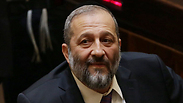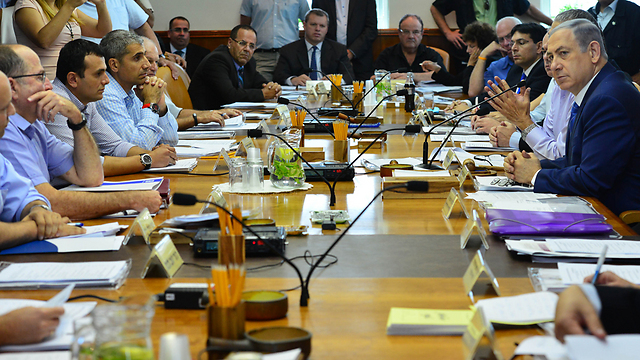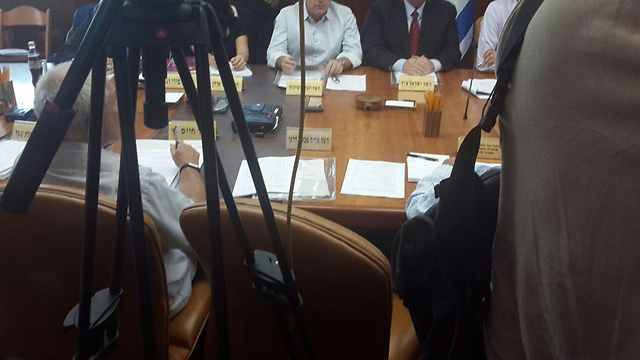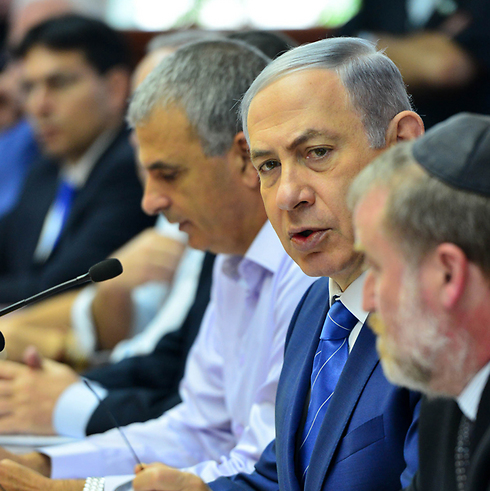
Government passes budget after last-minute deal making
After a long day of debating, nearly all the government's ministers fall in line resulting in approval of a biannual budget; Defense Minister Ya'alon abstains due to demand that the Locker Committee findings be implemented.
The government approved the 2015-2016 budget early Thursday morning after a long day of negotiations between treasury officials and reluctant ministers. Twenty ministers voted in favor, while Defense Minister Moshe Ya'alon chose to abstain from the vote.
Follow Ynetnews on Facebook and Twitter
Ya'alon refused to support the budget due to Prime Minister Benjamin Netanyahu's decision to uphold the Treasury's recommendation to set the defense budget at NIS 55.3 billion for 2016, and condition the raising of the budget to NIS 59 billion on the adoption of the principles of the Locker Committee whose report, submitted to the government last month, included far-reaching reforms.
Treasury officials managed to convince the reluctant ministers to adopt the budget throughout the day Wednesday, after additions to individual ministry budgets were promised to them. Public Security Minister Gilad Erdan removed his objection after being promised an additional NIS 1.7 billion to his budget over the next two years.
Culture and Sports Minister Miri Regev promised to support the budget after a decision was made to cancel planned cutbacks in her ministry's budget, and add an additional NIS 50 million per year to the ministry's coffers. Education Minister Naftali Bennett also removed his objections after planned cutbacks to the Education Ministry's budget were softened by NIS 290 million per year.
The battle to get the ministers on board was not simple, with the passing of the budget remaining in question throughout the day on Wednesday.
Shas ministers Aryeh Deri and David Azoulay had boycotted the government vote on Wednesday morning in protest of the original 2015-2016 state budget proposal.
On Tuesday, Netanyahu warned ministers that his government would collapse if they did not put a stop to their demands and rally behind his budget bill.
Ministers had already secured an extra NIS 8 billion shekels for the budget plan, which covers more than NIS 414 billion. But they are still asking for more spending on defense, police, and education, while also demanding the cancellation of value added taxes on basic goods.
"The State of Israel will have a budget because otherwise it will not have a government and our economic and security situation would deteriorate," Netanyahu said ahead of a meeting with key ministers.
"Demands always exceed what there is," he added. "But in the end the right decisions are made. We will do so this time as well."
Economy Minister and Shas leader Aryeh Dery and Religious Services Minister David Azoulay threatened to vote against the proposed budget because of a dispute with the Finance Ministry over VAT exemptions for the lower classes.
Sources close to Dery said that "the minister will not compromise. He demands 0% VAT on electricity and water for the poor and 0% VAT on public transportation for the entire population."
The sources had added that talks between the Shas chairman's representatives and the Finance Ministry reached a dead end.
Another possible hurdle to passing the budget was Education Minister Naftali Bennett's objection to a NIS 1 billion cut from his ministry's budget, claiming that "this is critically hurting preschool education in the periphery and math studies."
Bayit Yehudi ministers threatened to vote against the budget as well if this dispute was not resolved.
Finance Ministry officials said the cutback in question comes in two parts: 40 percent from the coalition funds promised to Bennett when his party joined the government (NIS 600 million), and NIS 780 million from the education budget (from an addition to the budget he was promised). Political officials said reducing the cuts in coalition funds could help pacify Bennett.
At the beginning of the government meeting, Prime Minister Benjamin Netanyahu called on the ministers to approve the budget. "The budget is balanced and responsible and meant to promote economic growth. As a result, every family will save hundreds of shekels every month, and that is significant," he said.
The prime minister lamented that the conversation is about how to split the pie, rather than how to grow it.
"We have to continue the (economic) growth, and that is why the level of taxing will not increase. When the money gets to the citizens, they will make better use of it than the bureaucrats would," he said. "There are reforms (in the budget) that reduce the cost of living for the citizens of Israel. It's important to reduce the prices of food, transportation and health, and increase the supply of housing."
"The Budget Department has been working for months to reach agreements," said Finance Minister Moshe Kahlon. "There is a significant expansion in civilian spending - in education, health, public security. The budget expansions are good and necessary. We're dealing with investments and with the periphery. These are significant growth generators."
Meanwhile, Culture and Sport Minister Miri Regev said she would fight for an increase in the culture budget. "We still have a long day and night. I hope we can reach an agreement during the day," she said.
Should the budget get cabinet approval it will go to the Knesset for a vote on August 31. The government is hoping for final parliamentary approval for the 13-month plan by November 19.
In addition to the budget, an accompanying bill would implement a series of reforms in housing, food and banks aimed at lowering the high cost of living, a long-standing frustration for Israeli voters over the past five or six years.
Reuters contributed to this report.













